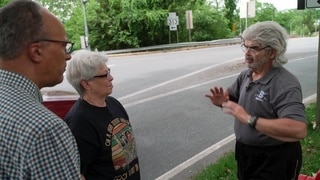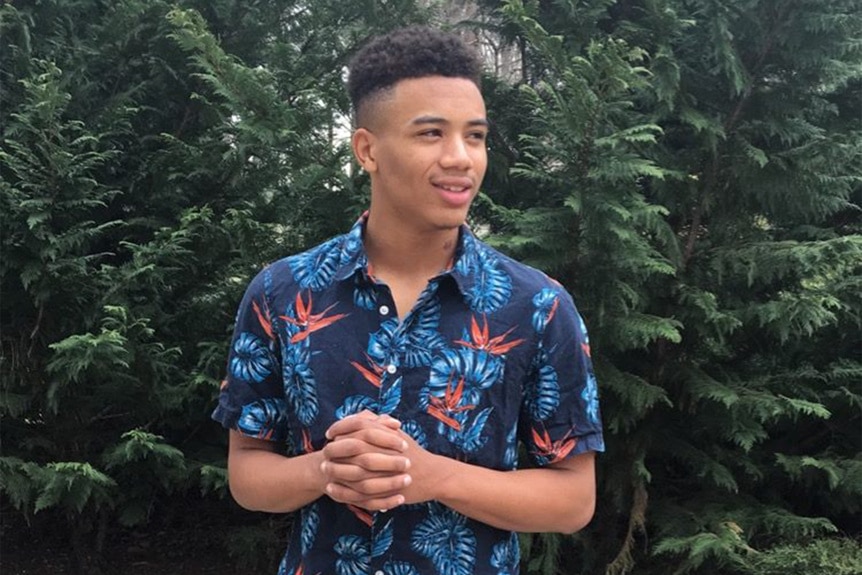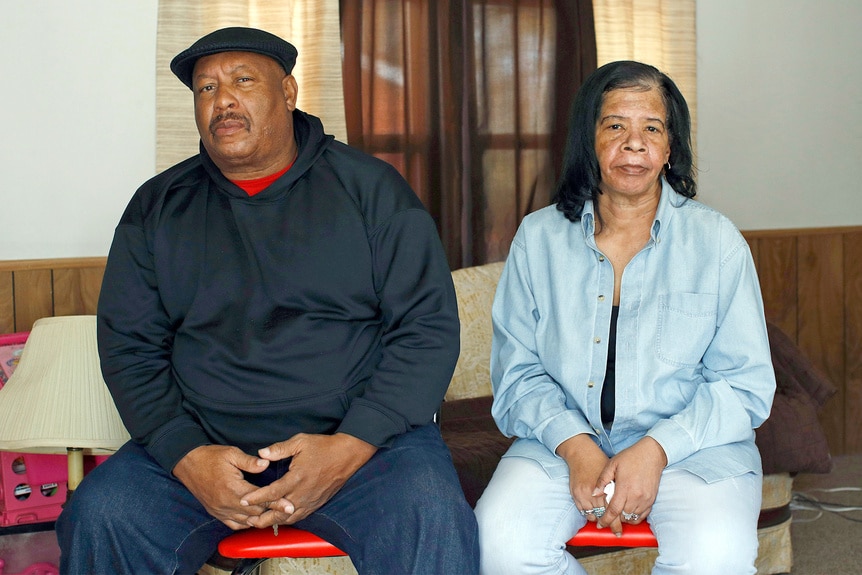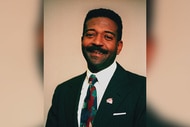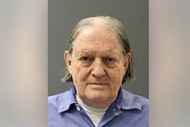Create a free profile to get unlimited access to exclusive videos, breaking news, sweepstakes, and more!
What Happened to 19-Year-Old Anton Black, Who Died During a Police Confrontation in Maryland?
Anton Black was struggling with his mental health when an incident with a younger boy prompted witnesses to call police, but what happened next divided the town of Greensboro, Maryland.
Anton Black, a Black teen from Maryland, took his last breath in 2018 while being restrained by police just steps from his front door.
Black’s anguished mother looked on as her son’s body suddenly went limp and resuscitation attempts failed to revive the 19-year-old.
“They didn’t let him up. I’m standing right there,” his mother Jennell Black told Dateline: Secrets Uncovered.
Black’s death divided the small town of Greensboro, Maryland, which some had described as a modern-day Mayberry, and raised questions about the actions of the police officers at the scene — including one with a controversial past.
The teen's death was ultimately ruled an accident and no charges were ever filed in connection to it, but questions still linger about the actions officers took that day.
Who was Anton Black?
Anton Black was a popular and beloved fixture in Greensboro. He was voted the high school homecoming king twice and was a standout athlete among his peers, participating in football, basketball, and track.
“He was a star wide receiver on the football team and Mid-Atlantic champion in the 100, 200 and high jump,” his father Antone Black said. “He was, you know, a very exciting young man to see. I used to love to see him run, oh and jump.”
After high school, Anton headed to college and also pursued a modeling career, but in the summer of 2018, his parents noticed he seemed to be going through a difficult time.
“To me, all of a sudden he got moody, he was crying, he was upset all the time,” Antone said.
Anton spent a week in the hospital, where he was diagnosed with bipolar disorder.
The day Anton Black died
On September 15, 2018, just 10 days after he was discharged from the hospital, Anton had been out playing basketball in a local park when he ran into his 12-year-old neighbor, Xavier, whom he'd know for years.
As the two walked back to their homes, two witnesses reported seeing Anton put Xavier into a headlock at around 7 p.m. Xavier would later tell authorities he believed Anton might throw him into the river as they passed over a bridge, so when one witness asked him whether he wanted them to call 911, he told them that he did.
Just a few minutes later, Greensboro Police Department officer Thomas W. Webster IV stopped Anton and Xavier along the side of the road.
RELATED: Connecticut Mom Raped At Home and Shocking Attacker Is Revealed To Be Someone She Knew
Xavier told Webster that Anton was schizophrenic, an inaccurate statement. As Webster was trying to assess the situation, Xavier walked off. Webster told Anton he needed to place him in handcuffs, but before he could, Anton responded, “I love you. I love you,” and then turned and ran away toward his home.
Webster got into his patrol car and set off in pursuit. Two officers from neighboring departments joined in and a civilian on a motorcycle also got in on the attempt to apprehend the teen.
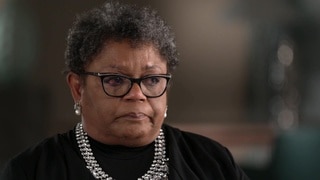
According to body cam footage — which took Anton’s family months to get released — Webster arrived outside of Anton’s home and found the teen locked inside a vehicle. Without saying a word to him, the police officer took out his baton, bashed the driver’s side window in and used a Taser on Anton.
“His behavior was so erratic and dangerous that we had to get him into custody,” Webster would later tell state investigators, adding that he feared Anton may have been retrieving a weapon.
“My end goal... was to get him subdued,” Webster continued. “He wasn’t responding to — to orders, uh, to stop resisting.”
After Anton got out of the passenger side of the car, the confrontation moved to a wood ramp that led to Anton’s front door. The officers and civilian wrestled Anton to the ground, as he called out for his mother.
“Thank you,” he can be heard saying in the footage. “You were always there.”
As the officers continued to restrain Anton, who was laying on his stomach, he was put in handcuffs and leg restraints.
Webster told Anton’s mother, who by this point had come outside, that they believed her son “needs help.” The officers said they planned to take him to the hospital rather than arrest him, but as they continued to hold him down, Anton suddenly went limp and stopped breathing.
Efforts to resuscitate the teen were unsuccessful and he died just steps away from his front door.
Anton Black's family reacts to body cam footage of his death
After viewing the body cam footage, Anton’s family was outraged.
“I saw and that’s why I can’t sleep to this day, I see him begging for his life. You know, he’s calling 'Mommy,' he never moved. They never got off of him,” Antone said.
He believes the amount of force used to restrain his son was unnecessary.
“He didn’t attack nobody. He didn’t rob a bank, he didn’t kill nobody. He’s at his mother’s doorstep. All he wanted to do was go home. He’s home and you don’t get off him? That’s not right,” Antone said, breaking down in tears.
RELATED: Surgeon Disappears During Wife's Birthday Trip to Greece and His Dark Secrets Come To Light
Jason Johnson, the president of the Law Enforcement Legal Defense Fund, would later defend the officers' actions, calling it a “very difficult” situation.
“I don’t see any indication of malice. I don’t see any indication of indifference to Mr. Black’s health or wellbeing and so I think it meets the professional standard,” he told Dateline: Secrets Uncovered. “They seemed to recognize that this was primarily a mental health emergency. They seemed empathetic in their communication both with Mr. Black and with Mr. Black’s mom. I really felt like it was a professional response.”
Who is Thomas W. Webster IV?
What made the incident with Anton all the more troubling was that it wasn’t Webster’s first brush with controversy. While working as a police officer in Dover, Delaware in 2013, Webster responded to a call about a fight. He stopped one of the suspects, a Black male named Lateef Dickerson, along the street and ordered him to get on his hands and knees.
Just as Dickerson appeared in dashcam footage to be complying with the order, Webster kicked him, striking him in the face. The kick knocked Dickerson unconscious and sent him face-first into the ground, which broke his jaw.
Webster was charged with second-degree assault after the incident, but claimed in court that he thought Dickerson was reaching for a gun and said that he meant to kick him in the upper body. He was acquitted on the charges against him.
“This sends us years backwards. We’re clearly not happy with this response,” La Mar Gunn, then-president of the Central Delaware NAACP Branch, told the media at the time.
Webster resigned as a police officer with Dover as part of an agreement with the city, which allowed him to keep his $230,000 pension.
Gunn told Dateline he thought Webster’s career as an officer was “done,” but two years later he was hired in Greensboro.
When Gunn learned Greensboro was in the process of hiring Webster, he reached out to the city manager.
“I went step-by-step and explained why you would have to hate the people you served to unleash that type of monster on unsuspecting citizens,” he said.
Christina Robinson, who had been like a second mother to Anton, went door to door to get signatures to try to remove Webster from his new post, but the town council decided to keep him in the position.
Just six months later, Webster responded to the call that would end Anton’s life.
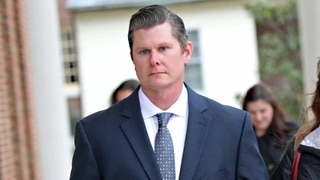
The controversy around Anton Black’s cause of death
In the aftermath of the incident, Maryland’s then-Chief Medical Examiner Dr. David R. Fowler declared Anton’s death had been an accident and found “no evidence” that his “restraint by law enforcement directly caused or significantly contributed” to the teen dying.
The autopsy report listed a heart defect as the cause of death, adding that his bipolar disorder was a contributing factor.
Fowler would later receive national attention after he testified for the defense in the trial of former Minneapolis police officer Derek Chauvin, who was later convicted of George Floyd’s 2020 murder. Fowler testified in that case that he believed the cause of Floyd’s death was undetermined.
As for Anton’s case, not everyone agreed with Fowler’s assessment.
Dr. Roger Mitchell, a former chief medical examiner for Washington, D.C. and head of pathology for Howard University, told Dateline: Secrets Uncovered that even if Anton had a heart defect, the struggle that occurred that day as officers tried to subdue him likely exacerbated it. He noted the autopsy detected petechiae and hemorrhaging of the eyes, suggesting asphyxiation.
Mitchell believes the manner of death should have been declared a homicide.
“Anton Black was in a fight and lost and that is a — that is a homicide,” he said.
RELATED: Idaho Nurse Cleans Up Her Lover's Bloody Crime Scene After He Brutally Kills His Fiancée
Maryland State Police also conducted an investigation into the officers’ actions that day, but no criminal charges have ever been filed.
Eleven months after Anton’s death, Webster was de-certified as a police officer and fired from the Greensboro Police Department.
Anton’s family received a $5 million settlement in August of 2022 against the City of Greensboro and other officials as a result of a civil lawsuit the family filed in the wake of his death. They also later settled with the state of Maryland and Fowler for an additional $100,000, although neither party admitted any fault in the settlement.
His family has been finding ways to honor his legacy. In 2021, they helped state officials pass Anton’s Law, which makes police misconduct records public.
“I want Anton to be a symbol of what could happen to anyone’s child,” his sister LaToya Holley said. “I want Anton to be remembered forever.”
